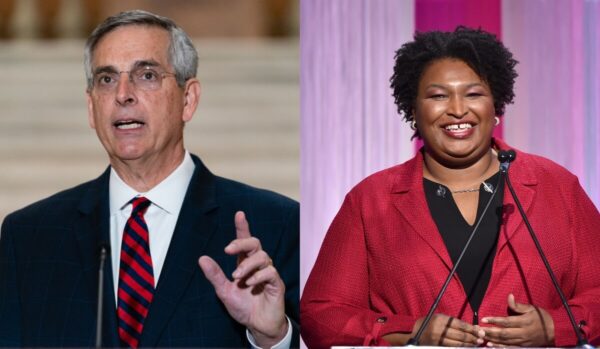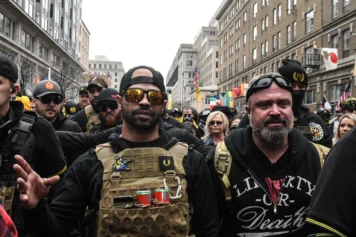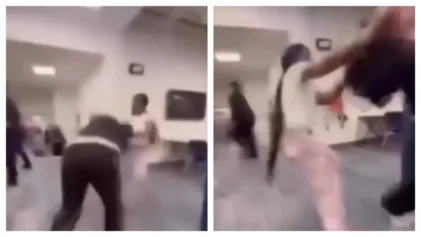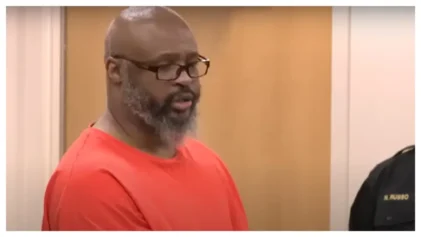The Georgia official who is responsible for overseeing the state’s elections is throwing blows at former gubernatorial candidate and voting rights activist Stacey Abrams, and folks are not putting up with it.
Brad Raffensperger is at it again, chucking the term “election denier” out loosely and seeing where it lands.
He first used the term against Georgia Sen. Raphael Warnock in 2022 after Warnock won his runoff election against Herschel Walker. In a Wall Street Journal op-ed flagrantly titled “Raphael Warnock, Election Denier,” Raffensperger denounced part of Warnock’s victory speech about the real threat and impact of voter suppression in the state, calling the charge “false.”

“I thought I had heard every conspiracy theory there was after the 2020 election, but the idea that Republicans control the weather to make it harder for Democrats to vote is a new one. … And I don’t even know what Mr. Warnock means by ‘all kinds of other tricks,'” Raffensperger wrote.
Now, he’s at it again. This time, taking aim at Stacey Abrams.
In a recent interview with Jen Psaki on MSNBC, Abrams said she wouldn’t rule out running for office again.
“Politics is a part of what I am and a part of what I do. My approach is to do the work. Politics is one of the tools that I can use to do so,” Abrams said.
Raffensperger posted a clip of that interview on his X account, in which he said, “The original election denier is thinking of running again. Georgia has free, fair, and secure elections and will withstand scrutiny once again.”
Unsurprisingly, barely anyone supported Raffensperger’s comment about Abrams.
“Hi, Brad! You are an election denier as well!” one person wrote underneath his post. “If you want to attack real election deniers, people who actually conspired to overthrow the election, you’ve got plenty of targets in your own party. How’s that Coffee County investigation going now that you’re actually working on it?,” another X user commented.
“Your post disappoints me Brad. You know the difference between Abram’s questioning the results and the GOP breaking laws and intimidating election workers. Shame on you. I thought you were better than this,” someone else wrote.
These “election denier” accusations are nothing new to Abrams. In fact, they’re purposely employed to muddle the lines for voters who are unaware that Abrams merely questioned the results of the 2018 Georgia governor’s race, which she narrowly lost to then-Secretary of State Brian Kemp, allegedly due to widespread voter suppression that impacted tens of thousands of voters, many of whom live in communities of color.
She never denied the results. Kemp was running the election he narrowly won over Abrams, which critics claimed was a conflict of interest.
Raffensperger worked to diminish Abrams’ claims of voter suppression in 2018 by telling the public not to “fall for any politically driven stories of either voter fraud or voter suppression.”
Yet, despite record turnout for the gubernatorial election that year, reports revealed that thousands of “infrequent voters” had their ballots purged in Georgia. Many others, chiefly voters of color, had their registration put on hold because the information they put on their registration form didn’t exactly match their driver’s license or social security records. That’s the work of Georgia’s “exact match” law.
Georgia Republicans on their high horses refused to investigate, let alone acknowledge rampant suppression efforts, but then passed an election law in 2021 that made it even harder for voters to submit ballots.
The measure removed voters’ ability to submit an absentee ballot request completely online by requiring a pen and ink signature, restricted access to absentee ballot drop boxes, and shortened the window during which absentee ballots can be requested and submitted. Also, an “unlimited” number of voting challenges can be submitted as long as county officials adjudicate them within 10 days.
Kemp has stated the law will protect elections, while critics argued it only perpetuates voter suppression.
Abrams has previously stated that voter suppression usually transpires through registration access, ballot access, and ballot counting.
Trending Now:
‘This Is Crazy’: Black Dock Worker Who Was Attacked In Montgomery Brawl Charged; Social Media Reacts
Never miss a story — sign up for ATLANTA BLACK STAR’S free daily newsletters to stay up-to-date on the latest developments, from top news headlines to celebrity news.


